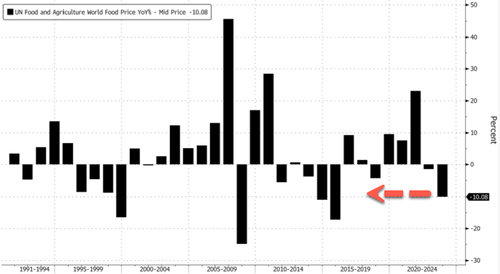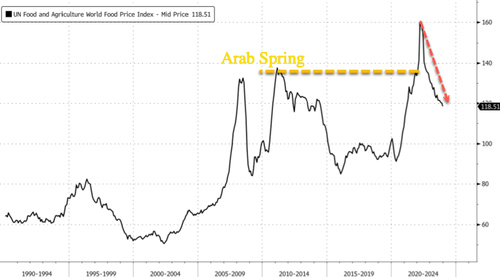Has The Global Food Inflation Crisis Been Averted?
Tyler Durden
 The latest United Nations' Food and Agriculture Organization data shows global food prices have just recorded the biggest annual decline since 2015. This is terrific news for emerging market countries whose governments have been battling high food inflation with mounting risks of social instability. The latest United Nations' Food and Agriculture Organization data shows global food prices have just recorded the biggest annual decline since 2015. This is terrific news for emerging market countries whose governments have been battling high food inflation with mounting risks of social instability.
The FAO Food Price Index, which tracks monthly changes in the international prices of globally traded food commodities, averaged around 118.51 at the end of 2023, down 10% from the previous year.

Although the index tracks the costs of raw commodities rather than consumer retail prices, the declines offer hints of easing supermarket prices in 2024. The jump in the index derives from many issues, such as Russia's invasion of Ukraine, global supply chain snarls, soaring inflation, and El Nino-related weather disruptions, which ignited a global cost-of-living crisis.
Bloomberg noted, "Corn and wheat futures prices saw their biggest annual declines in a decade last year, as supply concerns faded. Futures prices for hogs and palm oil also posted big declines."
Even though the global food index has dropped a quarter since peaking in March 2022, the index remains just below levels responsible for anti-government protests, uprisings, and armed rebellions in the 2010 Arab Spring.

As we noted in November, "Arab Spring 2.0? Gro Intelligence's Head Warns Global Food Crisis' Much Worse Than 2008'," the world is not out of the woods yet. And this, "Rice Nears 15-Year High As Global Food Crisis 'Much Worse Than 2008'."
 our mission: our mission:
to widen the scope of financial, economic and political information available to the professional investing public.
to skeptically examine and, where necessary, attack the flaccid institution that financial journalism has become.
to liberate oppressed knowledge.
to provide analysis uninhibited by political constraint.
to facilitate information's unending quest for freedom.
our method: pseudonymous speech...
Anonymity is a shield from the tyranny of the majority. it thus exemplifies the purpose behind the bill of rights, and of the first amendment in particular: to protect unpopular individuals from retaliation-- and their ideas from suppression-- at the hand of an intolerant society.
...responsibly used.
The right to remain anonymous may be abused when it shields fraudulent conduct. but political speech by its nature will sometimes have unpalatable consequences, and, in general, our society accords greater weight to the value of free speech than to the dangers of its misuse.
Though often maligned (typically by those frustrated by an inability to engage in ad hominem attacks) anonymous speech has a long and storied history in the united states. used by the likes of mark twain (aka samuel langhorne clemens) to criticize common ignorance, and perhaps most famously by alexander hamilton, james madison and john jay (aka publius) to write the federalist papers, we think ourselves in good company in using one or another nom de plume. particularly in light of an emerging trend against vocalizing public dissent in the united states, we believe in the critical importance of anonymity and its role in dissident speech. like the economist magazine, we also believe that keeping authorship anonymous moves the focus of discussion to the content of speech and away from the speaker- as it should be. we believe not only that you should be comfortable with anonymous speech in such an environment, but that you should be suspicious of any speech that isn't.
www.zerohedge.com
|


